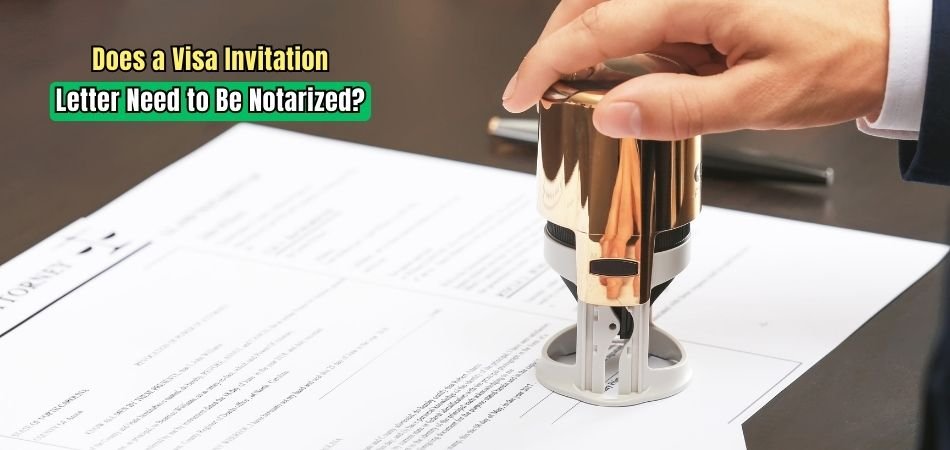Your cart is currently empty!

Obtaining a visa can be a complex process, and one essential document is the visa invitation letter. This letter often serves as proof of the purpose of your visit and can significantly impact the outcome of your visa application.
If you want a smooth visa application process, you need to know the requirements surrounding visa invitation letters. Notarizing them is one of those requirements. Now, you may think about this: Does a visa invitation letter need to be notarized?
The need for notarization can vary based on the country you are visiting and the specific requirements of their immigration authorities. In some cases, a notarized letter may enhance the legitimacy of your invitation, while in others, it may not be necessary. It’s vital to do your research and ensure that you meet the specific requirements set forth by the visa-issuing authority.
We will explore the details surrounding visa invitation letters, focusing on their purpose, the notarization process, and when it may be required. By the end, you will have a clearer picture of the intricacies involved in preparing your visa invitation letter.
What is a Visa Invitation Letter?
A visa invitation letter is a formal document provided by an individual or organization inviting someone from another country to visit for a specific purpose, such as attending a conference, business meeting, or family event. This letter serves as a crucial part of the visa application process, as it outlines the intent and details of the visit, helping the immigration authorities understand the legitimacy of the trip.

Typically, a visa invitation letter includes the host’s contact information, details about the invited guest, the purpose of the visit, the duration of stay, and an assurance of accommodation. This letter does not guarantee visa approval but strengthens the applicant’s case by showing a clear reason for the visit and a connection to the host.
When attending a conference in Canada, for instance, applicants may need to confirm the validity of Canada conference visa invitation letter requirements. Ensuring that the letter is accurate and meets embassy specifications can improve the likelihood of a successful visa application.
Does a Visa Invitation Letter Need to Be Notarized?
Many people wonder if they need to have this letter notarized. The answer often depends on the specific country you are visiting. A notarized letter can add credibility and help your application stand out.

Know the Purpose of a Visa Invitation Letter
A visa invitation letter is a document that your friend, family member, or an organization in the country you plan to visit provides. It explains why you are visiting and outlines your relationship with the person inviting you. This letter helps show visa officials that you have a valid reason to enter the country.
Check Specific Country Requirements
Visa rules can differ greatly between countries, so check the official embassy or consulate website of your destination. This website will provide clear guidelines about what documents you need, including any mention of notarization. By comprehending the specific requirements, you can avoid any surprises later in the application process.
Determine if Notarization is Requested
Some countries may explicitly state that a notarized invitation letter is required for your visa application. If the guidelines say notarization is necessary, be sure to follow these instructions closely. If it’s not mentioned, you may still want to consider notarizing your letter for added reassurance.
Consider Notarization for Added Credibility
Even if notarization isn’t mandatory, it can strengthen your application. A notarized letter indicates that the inviter’s identity has been confirmed by a notary public. This extra step can provide peace of mind to visa officials, as it adds a layer of authenticity to your invitation.
Prepare the Invitation Letter
When writing the invitation letter, include important details such as the inviter’s full name, address, and relationship to them. Clearly state the purpose of your visit and the duration of your stay. If you choose to have it notarized, ensure the inviter signs the letter in the presence of a notary public to validate it.
Submit Your Application
After preparing the invitation letter, include it with your visa application. If the letter is notarized, make sure to attach the notary’s seal as well. Double-check that all your documents are complete to avoid any delays in processing your visa.
While a visa invitation letter may not always need to be notarized, checking the specific requirements for your destination is essential. Taking the time to ensure you have the correct documents can help make your visa application smoother and less stressful.
Steps to Obtain a Notarized Visa Invitation Letter
If you determine that you need a notarized visa invitation letter, follow these steps to obtain one,
- Draft the Invitation Letter: Start by writing a clear and concise visa invitation letter. Include all essential information, such as the sender’s and recipient’s details, purpose of the visit, duration, accommodation, and financial support if applicable.
- Gather Supporting Documents: Collect any documents that support your invitation. This may include copies of your identification, proof of residence, or any relevant financial statements. Having these documents ready will help during the notarization process.
- Visit a Notary Public: Find a licensed notary public in your area. Schedule an appointment and bring your invitation letter and supporting documents. The notary will verify your identity and ensure that you understand the contents of the letter before notarizing it.
- Sign in the Presence of the Notary: You must sign the visa invitation letter in front of the notary. This step is crucial, as it confirms that you are the person making the invitation. The notary will then add their signature and seal, making the document official.
- Keep Copies of the Notarized Letter: Once the letter is notarized, make several copies for your records and the visa application process. You may need to submit a copy of your visa application and provide another copy to the visitor.
Benefits of Notarizing Your Visa Invitation Letter
Notarizing your visa invitation letter comes with several advantages. The core purpose of notarized invitation letters is to add an extra layer of authenticity and credibility to the document. Notarization helps benefit by confirming the identity. Here are some key benefits to consider.
- A notarized letter carries more weight with immigration authorities. It shows that you are serious about the invitation and have taken steps to verify its authenticity.
- Notarization helps prevent fraudulent invitations, giving authorities confidence in the legitimacy of your request. This can be particularly important for visitors coming from countries with a history of visa abuse.
- Having a notarized letter may expedite the visa application process. Immigration officials can process your application faster, reducing the likelihood of delays.
- Notarization provides a legal record of the invitation. In case of disputes or misunderstandings, having a notarized document can protect both the host and the visitor.
- Knowing that your invitation letter is notarized can provide peace of mind. You can feel confident that you have done everything necessary to support your visitor’s application.
Common Myths About Visa Invitation Letters
There are many misconceptions surrounding visa invitation letters. Here are a few common myths and the truths behind them.

- All Visa Invitation Letters Must Be Notarized
Truth: Not all visa invitation letters require notarization. The need for notarization varies based on the destination country and the specific visa requirements.
- An Invitation Letter Guarantees Visa Approval
Truth: While a visa invitation letter can strengthen an application, it does not guarantee approval. The final decision rests with the immigration authorities.
- Only Family Members Can Write Invitation Letters
Truth: Invitation letters can be written by anyone, including friends, colleagues, or organizations. The important thing is to provide a clear purpose for the visit.
- Visa Invitation Letters are Not Important
Truth: Visa invitation letters are crucial for many visa applications. They provide evidence of the visitor’s intent and purpose for travel.
- A Simple Email is Enough
Truth: A formal invitation letter is usually required, not just a casual email. The letter must include specific details to be considered valid.
Frequently Asked Questions (FAQs)
Here, we’ve addressed some common queries related to visa invitation letters and their notarization. These questions can help clarify the process and requirements for your visa application.
Who Can Write a Visa Invitation Letter?
Anyone can write a visa invitation letter, including friends, family, colleagues, or organizations. The important factor is to provide a clear purpose for the visit and include relevant details. Make sure the letter reflects the genuine relationship between the host and the visitor.
What Should Be Included in a Visa Invitation Letter?
A visa invitation letter should include the sender’s and recipient’s details, the purpose of the visit, duration of stay, accommodation details, and financial support if applicable. Providing complete information helps immigration authorities understand the visitor’s plans and intentions.
How Do I Obtain a Notarized Visa Invitation Letter?
To obtain a notarized visa invitation letter, draft the letter, gather supporting documents, and visit a notary public. Sign the letter in front of the notary, who will then verify your identity and notarize the document. Keep copies of the notarized letter for your records.
Can a Visa Invitation Letter Guarantee Visa Approval?
No, a visa invitation letter cannot guarantee visa approval. While it can strengthen the application, the final decision lies with the immigration authorities. Factors such as eligibility, financial stability, and travel history also play a significant role in visa approval.
Conclusion
Having a well-structured visa invitation letter is key to supporting a successful visa application. Whether or not notarization is necessary, including all the relevant information in your letter will greatly benefit your application. With the right preparation, you can create an effective invitation that meets the needs of both the visitor and immigration authorities.
It is crucial to know the answers to “Does a visa invitation letter need to be notarized?” The requirement for notarization varies based on the country, type of visa, and specific circumstances surrounding the visit. By following the steps outlined above, you can effectively navigate the process and ensure your visa invitation letter is both clear and credible.
Remember, a notarized visa invitation letter can provide added assurance to the immigration officials, enhancing your chances of a smooth visa application process. Being informed and prepared will help you achieve your travel goals with confidence.

Leave a Reply